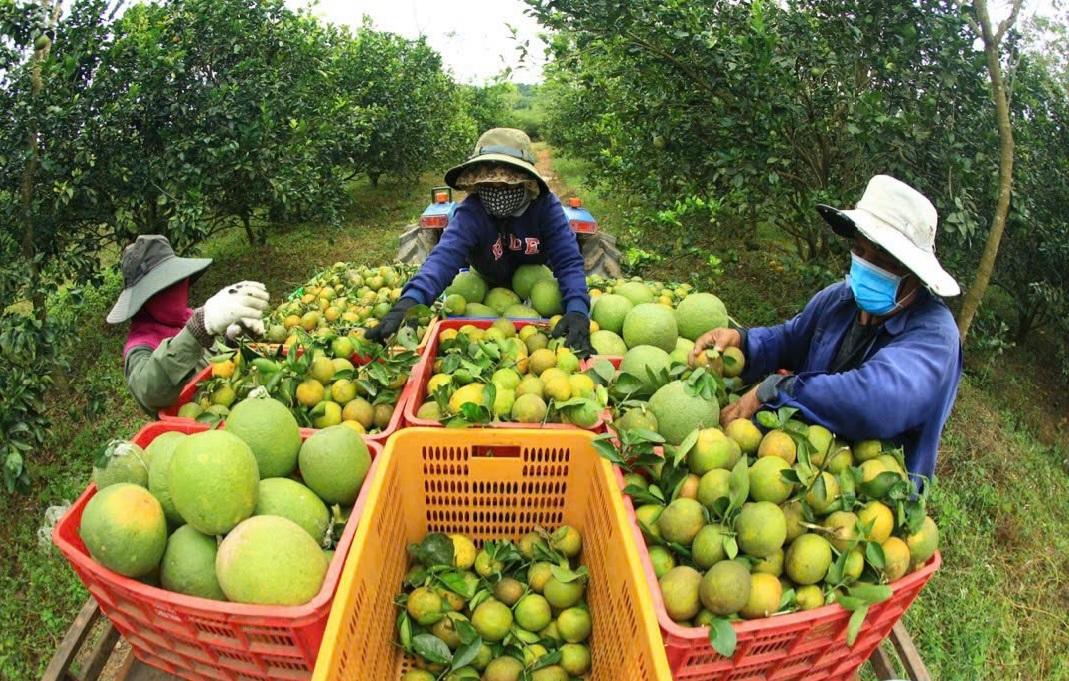Báo Bình Dương điện tử - www.baobinhduong.vn
Tổng Biên tập: LÊ MINH TÙNG
Phó Tổng Biên tập: HUỲNH MINH DÂN - NGUYỄN QUỐC LIÊM
Currently, organic agriculture is considered as an optimal production method that brings economic benefits to producers, improves consumers’ health and protects the environment. In Binh Duong, although organic production has been implemented by the agricultural sector, its scale remains small and lacks depth. Therefore, promoting the development of organic agriculture is an inevitable trend to ensure the sustainable growth of Binh Duong's agriculture.
Inevitable direction
A report at the seminar on social responsibility in agricultural production and business, and solutions for developing organic agriculture, ecological agriculture and circular economy in agriculture, organized by provincial Department of Agriculture and Rural Development yesterday (October 22), indicated that organic agriculture has been growing strongly in recent years and is expected to continue increasing. This is because organic agricultural production aligns with the policy of restructuring the agricultural sector towards enhancing added value, promoting sustainable, environmentally friendly development towards export. It also helps position and elevate the brand of Vietnamese agricultural products in general and those of Binh Duong in particular on the global agricultural map.

Developing organic agriculture and circular agriculture is a sustainable direction for the agricultural sector. In picture: Provincial leaders visit and survey a netted muskmelon growing model applying high technology in Phu Giao district’s An Binh commune
To implement sustainable agricultural development solutions, the province’s agriculture sector has applied the transfer of local indigenous microorganisms (IMO) in handling household waste, producing organic fertilizer to support agricultural production and organic farming via the implementation of a science and technology project in Tan Uyen city since 2022. Accordingly, Tan Uyen city has established IMO clubs in Bach Dang commune and Thanh Hoi commune to conduct pilot projects, aiming at transfering this practice to more than 2,000 households in these two communes while expanding it to other localities. This model has contributed to raising citizens’awareness and responsibility of environmental protection; reducing the amount of household waste that needs to be transported and treated; increasing the reuse of organic materials to create fertilizer for crops, lowering agricultural production costs, protecting the environment and preserving a clean, green and beautiful landscape.
In addition, the agricultural sector has collaborated with localities to accelerate the application of drip irrigation, mist irrigation and irrigation combined with fertilization and pesticide application into crop production. Currently, the adoption rate of these technologies exceeds 90%. According to the functional sector's assessment, over 90% of wastewater generated from animal husbandry has been treated through biogas systems, which are then reused for garden irrigation. More than 85% of solid waste is collected and composted with microbial additives to produce garden fertilizer. Currently, the province is home to 14 large-scale farms carrying out conformity assessment of wastewater from animal used for crops under regulations...
Many advantages
Although the province’s agricultural sector accounts for less than 3% of the province's economic structure, key agricultural products are increasingly affirming their reputation and position, with high productivity and quality. Espencially, in order to develop agriculture in an industrialized province, Binh Duong has recently promoted several policies to support and encourage agricultural development towards urban agriculture and high-tech agriculture. The province has also focused on linking agricultural production and consumption, fostering technologies for the preliminary processing, preservation and processing of agricultural, forestry and fishery products.

The VietGAP citrus fruit tree-growing model of Tam Lap Agricultural Cooperative in Phu Giao district reaches high yields with good quality, ensuring safety for consumers’ health
To improve the effectiveness of organic agricultural production, many businesses, cooperatives and farming households in the province have emphasized the task of diversifying crops and livestock in a sustainable manner in line with each area’s real conditions. A prominent example is the citrus fruit trees-growing model of Dan Tien agricultural, trade, service and transport cooperative, which cultivates over 50 hectares of green-skinned pomelos and oranges under the VietGAP standards. According to Nguyen Van Tien, Director of the cooperative said that the cooperative not only supports environmentally friendly organic and VietGAP production, but also actively helps members and farmers connect with markets to sell their products. The cooperative focuses on safe production, prioritizing organic fertilizer and biological pesticide. As a result, its products are always safe, with production levels on sharp increase and win consumers’ trust. The cooperative has also invested in a net house system and applied an automatic irrigation system to tend its fruit orchards. Currently, the cooperative combines production with agricultural tourism, offering such activities as fruit picking, recreational fishing, swimming, camping…
According to Pham Van Bong, Director of provincial Department of Agriculture and Rural Development, organic and circular agricultural production towards a green agriculture system, is an irreversible trend in the agricultural sector. In the coming time, the Department will strengthen efforts to raise public awareness of the long-term benefits of organic and circular farming. They will further expand the results of the project on developing organic agricultural production models. The Department will also implement support policies for organic agricultural development such as encouraging businesses and cooperatives to link production with the consumption of organic, circular products; providing assistance for organic certification; supporting organic seeds for production; promoting the development of organic products that meet OCOP standards; associating organic product development with ecological and experiential tourism. Additionally, the Department will support the promotion and marketing of organic products…
Reported by Thoai Phuong-Huong Thao-Translated by Kim Tin